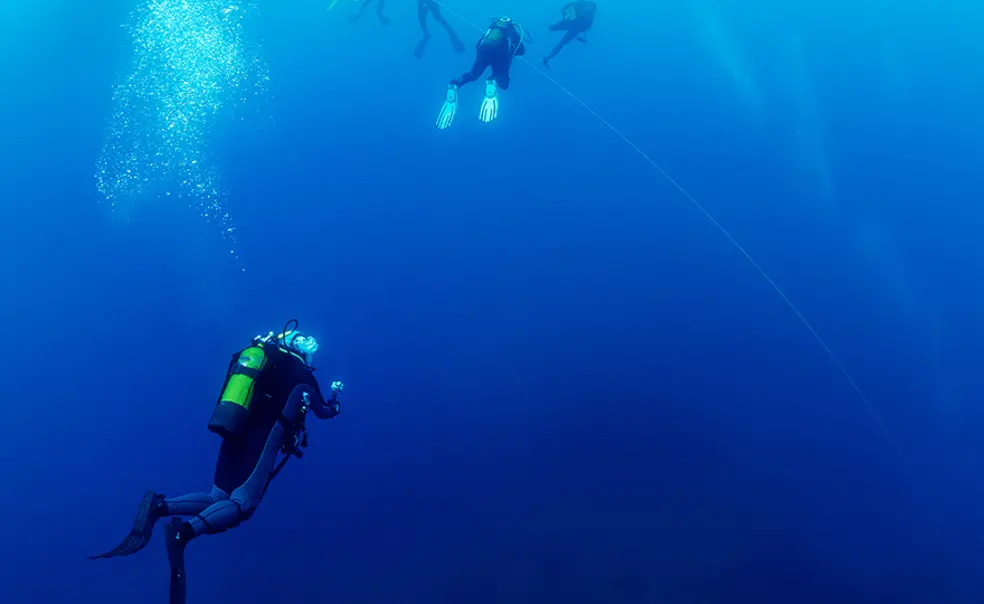In the Early ’60s, the First Semester at Princeton Caused a Case of the Bends
‘Rising fast can be painful. … But the condition is rarely fatal, and the pain disappears with time’
I first heard of the bends on the 1950s television series Sea Hunt. Aboard his cabin cruiser, The Argonaut, Captain Mike Nelson (played by Lloyd Bridges) never failed to warn scuba divers of the dangers of rising too fast to the surface. Doing so, he solemnly intoned, can lead to decompression sickness, commonly known as the bends, a painful condition that can be fatal.
Reflecting on my first year at Princeton 60-odd years ago, it occurs to me that I suffered from the bends — not the physical condition Captain Mike warned of, but its psychological and emotional counterpart. Like a diver’s case of the bends, my case was painful. And like a diver’s, it resulted from rising too fast.
I came to Princeton from a farm in Floyds Knobs (no kidding), Indiana. I had always excelled academically, graduating at the top of my class at the public high school in the county seat, New Albany. I had been socially successful as well. Heck, I was elected president of my 4-H club!
I was proud to be admitted to Princeton. But even before classes started, I felt out of place. As I unpacked, I was struck by the difference between my clothes and those of my dormmates. My brightly patterned shirts were homemade, sewn by my mother, as was my one sport coat (the one I’m wearing in my Freshman Herald photo). Everything else I wore came from JC Penney, including my skinny neckties (both of them).
I constantly betrayed my lack of worldliness. For the first several weeks, when classmates spoke of “going into the city,” I assumed they meant crossing Nassau Street into the town of Princeton, not heading into New York. By my standards, Princeton qualified as a city. After all, it was infinitely larger than Floyds Knobs. (For four years I endured classmates’ jokes about Floyds Knobs being a one-stoplight town. The joke was on them: Floyds Knobs had no stoplight!)
Once classes began, I felt even more out of my depth. It wasn’t just that I didn’t know the answers. Often, I couldn’t comprehend the questions. I literally didn’t know what I didn’t know. Each writing assignment was a fresh hell.
I was depressed and scared of failing, of flunking out. In October, as our first midterm exams loomed, I was terrified — so terrified that upon hearing of the Cuban missile crisis, my first thought was, If there’s a nuclear war, maybe exams will be canceled! I don’t want to be incinerated in a nuclear holocaust, but at least I wouldn’t have to take the exams!
(Spoiler alert: The Cuban crisis ended peacefully, nuclear holocaust was averted, exams were held, and I passed, but not by a lot.)
In short, I was as lost academically as socially. I was miserable on both fronts. Would I ever fit in? Could I survive the academic requirements? Or by moving from Floyds Knobs and New Albany High to Princeton, had I disregarded Captain Mike’s warning? Had I tried to rise too fast?
In retrospect, I believe that the answer is yes. Given my background and immaturity, the abrupt transition did, in fact, result in pain on both the social and academic fronts. I was anxious and depressed. I had a case of the emotional and psychological bends.
But remember, Captain Mike didn’t say the bends is fatal, only that it can be. He failed to mention that fatal cases are extremely rare. Nor did he point out that the pain of the bends virtually always disappears over time.
So it was with my case. I was in pain but didn’t suffer the academic equivalent of fatality, neither flunking out nor withdrawing. With the energy and resilience of youth, I adapted and survived. By the end of freshman year, the pain was gone. I had survived the bends.
Sea Hunt disappeared from the television screen long ago, but Captain Mike’s advice remains as true today as it was back then: Rising fast can be painful. It’s true whether you’re returning to the ocean’s surface after a dive or moving from home to a top-tier college. But the condition is rarely fatal, and the pain disappears with time.
After Princeton, Norm Tabler ’66 earned a master’s degree at Yale and law degree at Columbia, then practiced law for 50 years in Indiana (but not Floyds Knobs).












No responses yet